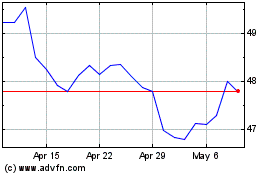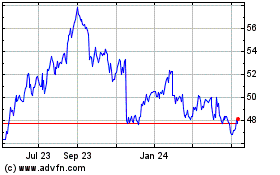By Joann S. Lublin
Amy Chang got unusually frank feedback when the new director of
Cisco Systems Inc. walked out of her first board meeting last
December.
Longtime board member Carol Bartz chided the then 39-year-old
tech executive for apologizing when she posed questions during the
meeting.
"You have the right to ask questions," said Ms. Bartz, a Cisco
director since 1996. Ms. Chang says the guidance helped her
understand how things worked on the networking giant's board,
though she had been a corporate director elsewhere.
More boards are pairing new members like Ms. Chang with seasoned
mentors like Ms. Bartz as they scramble to improve their oversight
of management in the face of intensified investor scrutiny. Board
buddies can help newcomers figure out the boardroom's cultural
norms, power brokers -- and even the right place to sit.
Mentors make sure "you don't come in as a bull in a china shop,"
observes Steven R. Walker, managing director of the board services
group at the National Association of Corporate Directors.
A 2016 survey conducted by the association found that 33 of 296
U.S. companies with orientation programs for directors choose an
experienced board member to guide their latest member.
Other businesses with formal mentoring efforts include Foot
Locker Inc., Applied Materials Inc. and Nasdaq Inc.
The boardroom buddy system was virtually unheard of five years
ago, governance specialists say. "We could see at least 50 Fortune
500 companies with new director mentor programs by 2020," predicts
Rusty O'Kelly, head of the board consulting and effectiveness
practice at recruiters Russell Reynolds Associates Inc.
Boards that integrate new members sooner should "make better
decisions and produce better results for shareholders," Mr. O'Kelly
adds. But the concept is so new that there is little concrete
evidence that they actually accelerate the impact of newcomers.
Ms. Bartz, Cisco's independent lead director, became its first
mentor when Ms. Chang joined the board last October. Ms. Bartz says
"the biggest benefit is having an effective board member
faster."
The best mentors counsel new directors before and after board
meetings for at least six months, governance experts say. Without
such hand-holding, new directors typically take about nine months
to assimilate.
"It's a really efficient and practical way to assure that the
new directors get the most out of the early meetings," says Dick
Johnson, chief executive of Foot Locker. The sports retailer began
a board mentorship program when the latest two members arrived in
2016.
Cisco directors endorsed the idea partly because some prior
board recruits "weren't a good culture fit," says Cassandra
Frangos, vice president of global executive talent.
Ms. Chang, a former Google Inc. executive who runs privately
held tech firm Accompany Inc., spoke with Ms. Bartz for several
hours before her inaugural Cisco board meeting. They met three
times in the glass-roofed conservatory of Ms. Bartz's suburban San
Francisco mansion.
"She really took the time to walk me through things," Ms. Chang
says. Ms. Bartz described the context for several board colleagues'
beliefs, the complex global risks facing Cisco and the importance
of observing board committees for months before Ms. Chang took a
committee seat.
Ms. Bartz also recommended where the newcomer should sit in the
boardroom "so I literally wouldn't be taking anyone's seat at the
table, " Ms. Chang says."That's the tiniest thing, but it is
important."
Following her initial board meetings, Ms. Chang usually asked
Ms. Bartz, "How did I do?" Ms. Bartz says her briefings and
feedback brought Cisco's youngest-ever female director up to speed
quickly.
Brent Saunders, a Cisco director since March, says he especially
appreciates being mentored by industry veteran Michael Capellas.
Like Ms. Bartz, Mr. Capellas has led big tech businesses.
"I come into Cisco certainly having very strong experience
running public companies (though) not with a tremendous grasp of
technology," says Mr. Saunders, CEO of drugmaker Allergan PLC.
"They have a different vernacular."
Over a glass of wine this spring, Mr. Capellas briefed Mr.
Saunders about why Cisco developed a new security service just
before the board discussed the service's imminent launch. The
mentor also talked about Cisco products, such as its switches -- a
technical term for networking hardware that puzzled Mr. Saunders.
He told Mr. Capellas he had seen the word in board briefing
materials, but "didn't know what it was."
That mentoring session persuaded Mr. Saunders to propose a
formal board buddy program for Allergan.
Board mentoring relationships sometimes take time to develop,
especially when programs aren't highly structured. That proved true
for Judy Bruner, a former finance chief who joined the board of
semiconductor maker Applied Materials in 2016. Its mentorship
effort is fairly informal, she says.
Ms. Bruner and her mentor, Dennis Powell, say they have forged a
relationship, mainly through casual chats following board and
committee meetings. She thinks companies should "make sure the
mentor and mentee have connected appropriately." This summer, she
arranged a mentoring lunch with him.
Informality "is just the beauty of this kind of program," Mr.
Powell notes.
Write to Joann S. Lublin at joann.lublin@wsj.com
(END) Dow Jones Newswires
September 18, 2017 17:25 ET (21:25 GMT)
Copyright (c) 2017 Dow Jones & Company, Inc.
Cisco Systems (NASDAQ:CSCO)
Historical Stock Chart
From Mar 2024 to Apr 2024

Cisco Systems (NASDAQ:CSCO)
Historical Stock Chart
From Apr 2023 to Apr 2024
